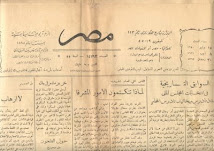
May 2010
(Covering April 1, 2009 - March 31, 2010)
A newly released report by the United States Commission on International Religious Freedom found a serious problems of discrimination, intolerance, and other human rights violations against members of religious minorities, as well as disfavored Muslims, remain widespread in Egypt. The reporting period marked s significant upsurge in violence targeting Coptic Orthodox Christians.
The report indicated that the Egyptian government has not taken sufficient steps to halt the repression of and discrimination against Christians and other religious believers, or, in many cases, to punish those responsible for violence or other severe violations of religious freedom. This increase in violence, and the failure to prosecute those responsible, fosters a growing climate of impunity. Implementation of previous court rulings - related to granting official identity documents to Baha'is and changing religious affiliation on identity documents for Christian converts - has been limited and subject to onerous delays.
Due to persistent and serious concerns, Egypt remains on USCIRF's Watch List in 2010. Egypt has been on the Watch List since 2002. USCIRF traveled to Egypt in January 2010 to assess religious freedom conditions in the country. The visit took place just weeks after six Coptic Christians and one Muslim were killed outside a church on Coptic Christmas eve in the town of Naga Hammadi. This incident served as a wake-up call to growing sectarian tensions and other religious freedom issues. Other needed reforms also should be immediately implemented, such as removing religion from official identity documents and passing a unified law for the construction and repair of places of worship.
In addition, All Baha'i institutions and community activities have been banned since 1960 by a presidential decree. As a result, Baha'is, who number approximately 2,000 in Egypt, are unable to meet or engage in group religious activities. Over the years, Baha'is have been arrested and imprisoned because of their religious beliefs, often on charges of insulting Islam.
Almost all Baha'i community members are known to the state security services, and many are regularly subject to surveillance and other forms of harassment. Al-Azhar's Islamic Research Center has issued fatwas in recent years urging the continued ban on the Baha'i community and condemning Baha'is as apostates.
Intolerance of Baha'is has increased in both the independent and government-controlled media in recent years. In March 2009, several Baha'i homes in a village in the Sohag province were vandalized by Muslim villagers. Egyptian human rights groups immediately condemned the violence and contended that a contributing factors to the attacks was incitement by a media commentator who, during a television program, labeled an individual member of the Baha'i faith an apostate and called for her to be killed. According to the Egyptian Interior Ministry, several alleged perpetrators were arrested; however, it is unclear if they were released. More than one year after the incident, there has been no investigation or prosecution related to the attacks.
In March 2009, the Supreme Administrative Court rejected a final legal challenge to a 2008 lower court ruling that required the Egyptian government to issue national identification documents to three Baha'i plaintiffs containing a dash or other mark in the space designated for religious affiliation. Until this ruling, identification documents permitted registration in only one of the three officially approved faiths - Islam, Christianity, or Judaism - thereby effectively preventing Baha'is from gaining the official recognition necessary to have access to numerous public services, and without which it is illegal to go out in public.
Since the 2008 decision, the government has issued birth certificates to at least 120 Baha'is, documents which it previously refused to issue. In addition, approximately 20-30 single male and female Baha'is have received identity cards. However, no married couples have been able to received identity cards because the Egyptian government does not recognize Baha'i marriages. Over the past few years, some Baha'is lost their jobs and a few young Baha'is were dismissed from universities because they did not have identity cards.












6 comments:
لقد أردت أن آخر شيء مثل هذا على موقعي وهذا اعطاني فكرة. هتاف.
لقد أردت أن آخر شيء مثل هذا على موقعي وهذا اعطاني فكرة. هتاف.
أنا أحب موقعك. ممتاز المحتوى. الرجاء مواصلة نشر cotent عميق من هذا القبيل.
الحياه كلها افكار جديده,اتمنى ان ارى المدونه بتاعتك
Thank you Joven.
انا بحاول ان انشر مرة فى الشهر
Post a Comment